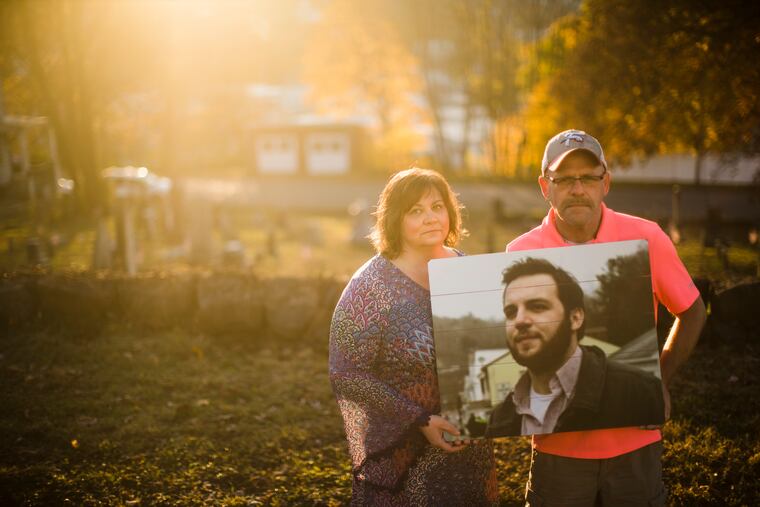A young Pa. mayor, his friend, and a fatal attraction to opioids
The family of a young Pennsylvania mayor is speaking out for the first time about his sudden death one year ago

MOUNT CARBON, Pa. (AP) — Brandon Wentz agonized over his resignation letter.
The 24-year-old mayor of Mount Carbon had just moved with his family to a nearby town, requiring him to give up the office. Normally so good with words, Wentz strained to find just the right ones to express himself. He felt like he was letting his constituents down.
It was a small thing, that letter, but his inability to write it reflected the struggles Wentz had been experiencing of late.
"You could just see the stress and sadness in him," recalled his mother, Janel Firestone.
After tinkering with it for several days, Wentz finally sent a brief missive to the town secretary. Then he met up with a close friend, Ryan Fessler. They hung out in Wentz's room for a while, and Fessler left.
Wentz was dead by morning. The cause: an overdose of heroin and fentanyl.
A police investigation was launched into his death, and state troopers sought to question Fessler. But they would never get the opportunity. Fessler, too, would die of an overdose.
Two friends poisoned by the same deadly cocktail; two families, left to suffer and to question who and how and why.
Wentz's passing on Nov. 9, 2017, came near the end of a year that saw a record number of U.S. drug overdose deaths. Two weeks before Wentz died, President Donald Trump declared the opioid epidemic to be a "public health emergency."
By that time, fentanyl had emerged as one of the biggest threats.
A synthetic opioid both cheap to produce and more powerful than heroin, fentanyl has flooded the illicit drug market in recent years. The drug was implicated in two-thirds of Pennsylvania's 5,456 overdose deaths in 2017, a 150 percent increase in just two years in one of the nation's hardest-hit states.
Wentz's family never saw it coming.
"I would not have thought my son would be a statistic," said Firestone, speaking publicly about the circumstances of her son's death for the first time. "I never would've thought he had an issue. ... Brandon made a mistake and paid the ultimate price."
Wentz had a lot going for him. Following his grandmother and mother into public service, the young man known by all as "Honcho" was just 22 when he became mayor of Mount Carbon, population 87, a speck of a town in eastern Pennsylvania's coal region. He was a doting older brother, a professional writing major at Kutztown University, a hoops fan who covered the NBA for a sports website. Universally well liked, he had a wide circle of friends and could make anyone laugh.
But Wentz had another side. His closest companions were aware he was dabbling in heroin. At some point, he befriended Ryan Fessler, whose own struggle with drugs started with the prescription painkiller Percocet and later shifted to heroin.
"He wasn't a bad person, he was nice, but he had his own demons, too, and demons will invite more demons," Wentz's friend, Brandon Radziewicz, said of Fessler.
Wentz's family, meanwhile, had no idea he was using opioids.
What they could see was that his life had taken a turn.
A few months after becoming mayor, Wentz pleaded guilty to DUI and lost his driver's license, which forced Wentz, a commuter student, to take a leave from Kutztown.
His brush with the law impacted him deeply. He was upset his classmates were leaving him behind, and disappointed he let himself and his family down. Wentz had suffered anxiety and depression since high school, and now those symptoms grew worse.
Friends believed his heroin use became more frequent in the months leading up to his death.
A distraught Fessler returned to Wentz's house not long after his friend's body was removed and promised Firestone he would "turn myself in."
Despite his pledge, Fessler did not reach out to police. He told his girlfriend one that that he'd supplied the drugs that killed Wentz.
Consumed by grief, Fessler's addiction grew worse.
His mother, Kim Kramer, begged her son to move to Florida to be with his father, thinking he'd have a better shot at recovery there.
Fessler agreed. He spent the early part of 2018 in the Sunshine State, in treatment. He was doing better.
But Fessler also faced unrelated drug charges in Pennsylvania, and he had to return for a hearing. His family worried he would relapse.
Firestone caught wind of Fessler's scheduled court appearance, alerting state police that he would be back in town. A trooper told her he planned to go to the hearing to ask him about Wentz's death.
But Fessler never made it.
Early on the morning of April 16, he fatally overdosed on heroin and fentanyl, the same combination that killed Wentz. He'd been in Pennsylvania just over two days.
Firestone cried anew when she learned of Fessler's death. She was sad for his mom, and frustrated that the truth about her own son's death might never come out. There were times when she couldn't help but hate Fessler, even as she understood that he struggled, too.
Kramer says she understands Firestone's feelings toward her son — because she feels the same about her own son's supplier. Police are still investigating Fessler's death, trying to find out where he got the opioids that killed him.
“I’m there,” Kramer said. “I get it, I truly do. You wake up, you think about it all day, it’s forever there. You want to find out who gave it to them. ... You want to hate the one who handed your son the bag.”